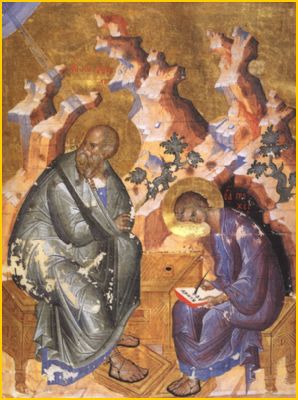|
|||
|---|---|---|---|
| This weekly bulletin insert complements the curriculum published by the Department of Christian Education of the Orthodox Church in America. This and many other Christian Education resources are available at http://dce.oca.org. | |||

In the Gospel of John 12: 19-47, Jesus Christ describes the kind of life His followers should pursue. His words need careful attention. He says, "He who loves his life will lose it, and he who hates his life in this world will keep it for eternal life." At a superficial glance, a reader might almost think that what He is saying sounds unkind. It could seem that Jesus is saying that you'll have your life forever if you hate it, but if you love your life you'll lose it. But this is why a reader should always look more deeply into the words of Scripture than many people do. These words in John's Gospel are nothing less than a promise of the eternal joy of the Kingdom—but they place the decision of whether or not that will be our destiny squarely on us. Jesus tells us this by saying, "If any man serves me, let him follow me; and where I am, there shall my servant be also; if any one serves me, the Father will honor him." So, what does it mean to hate one's life? It doesn't mean that we should despise or reject God's gift of being born and living as a person in this world. We are meant to live a full, rich earthly life. But if we limit ourselves to this life, never looking beyond it to eternal life with God, we will not be doing His will. To follow Christ means we must be ready to suffer for Him, because this fallen world will bring suffering. If we deliberately avoid suffering for Christ, we will no longer be following Him, and we will not find our way to the Kingdom. We will have loved our life in this world, and tried to preserve it, at the cost of the eternal life God wants to give us. To hate our life means to see that the present life, while precious, is brief and fleeting. By contrast, eternal life will never end. Loving that eternal life, we are willing to "give up" this earthly one. We can endure hardship and tribulation for Christ while we live it, because we know that by so doing we are following Him; we are on the way to the place where we will be with Him forever in joy. Jesus goes on to say, "Now is my soul troubled; and what shall I say? 'Father, save me from this hour'? No, for this purpose I have come to this hour." These words show that Jesus, like us, is fearful and apprehensive at the coming of death. He, too, loves the life in this world that God has given. But He is ready to do what He has called us to do. He will give up this life in certainty that He will be with His Father in eternal life. That life is His by nature. It is ours by adoption and immeasurable grace. |
|||
